What Are Turkey Tail Mushrooms?
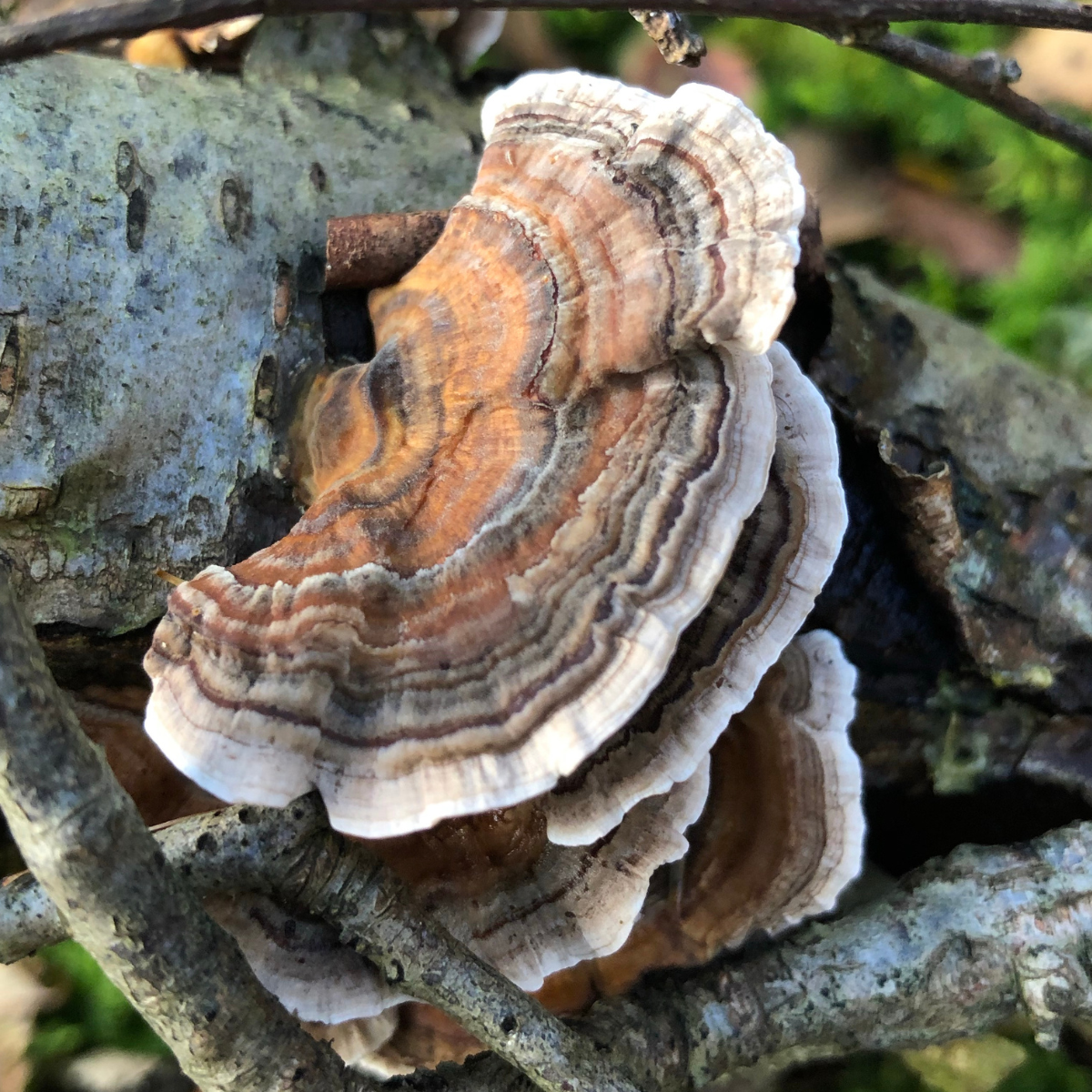
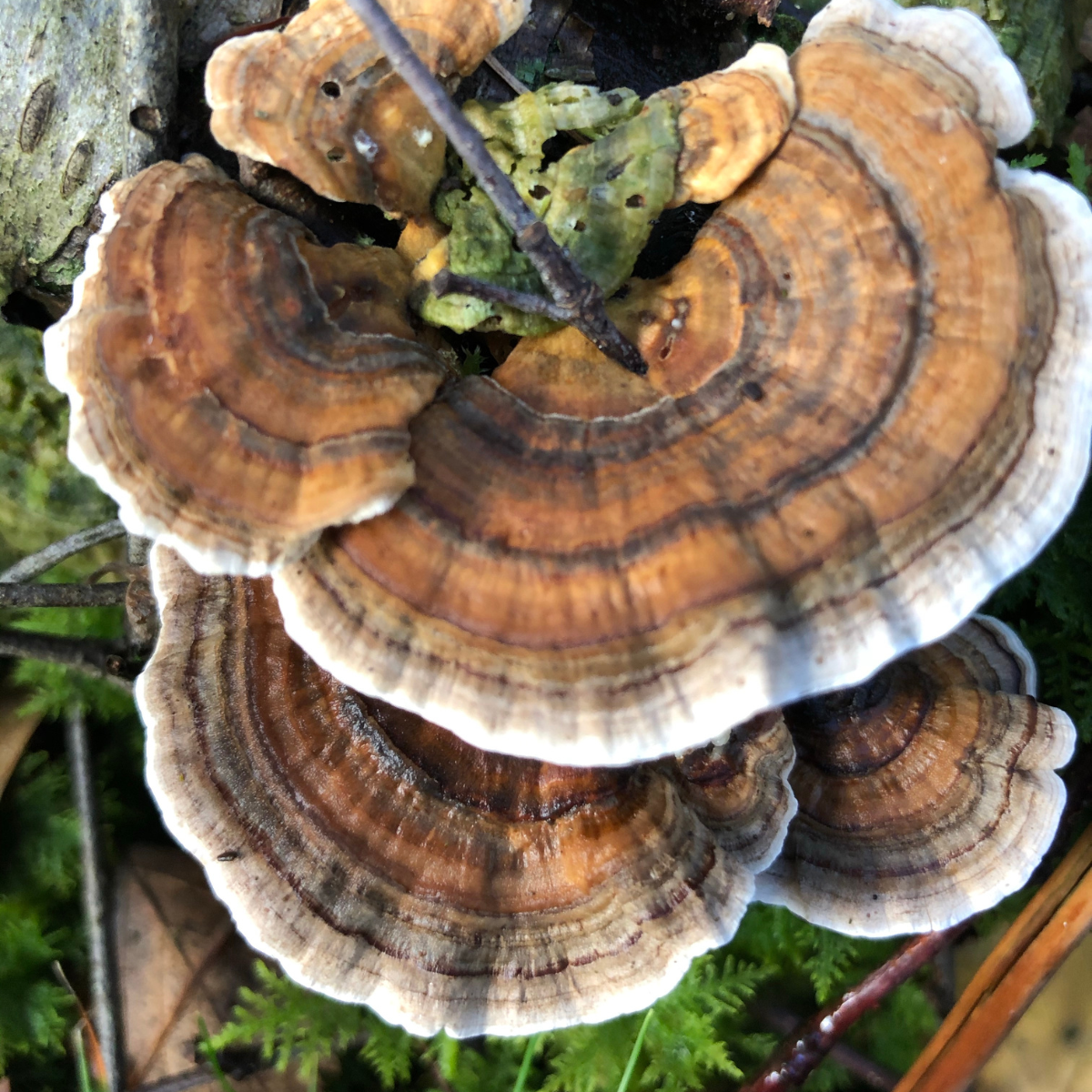
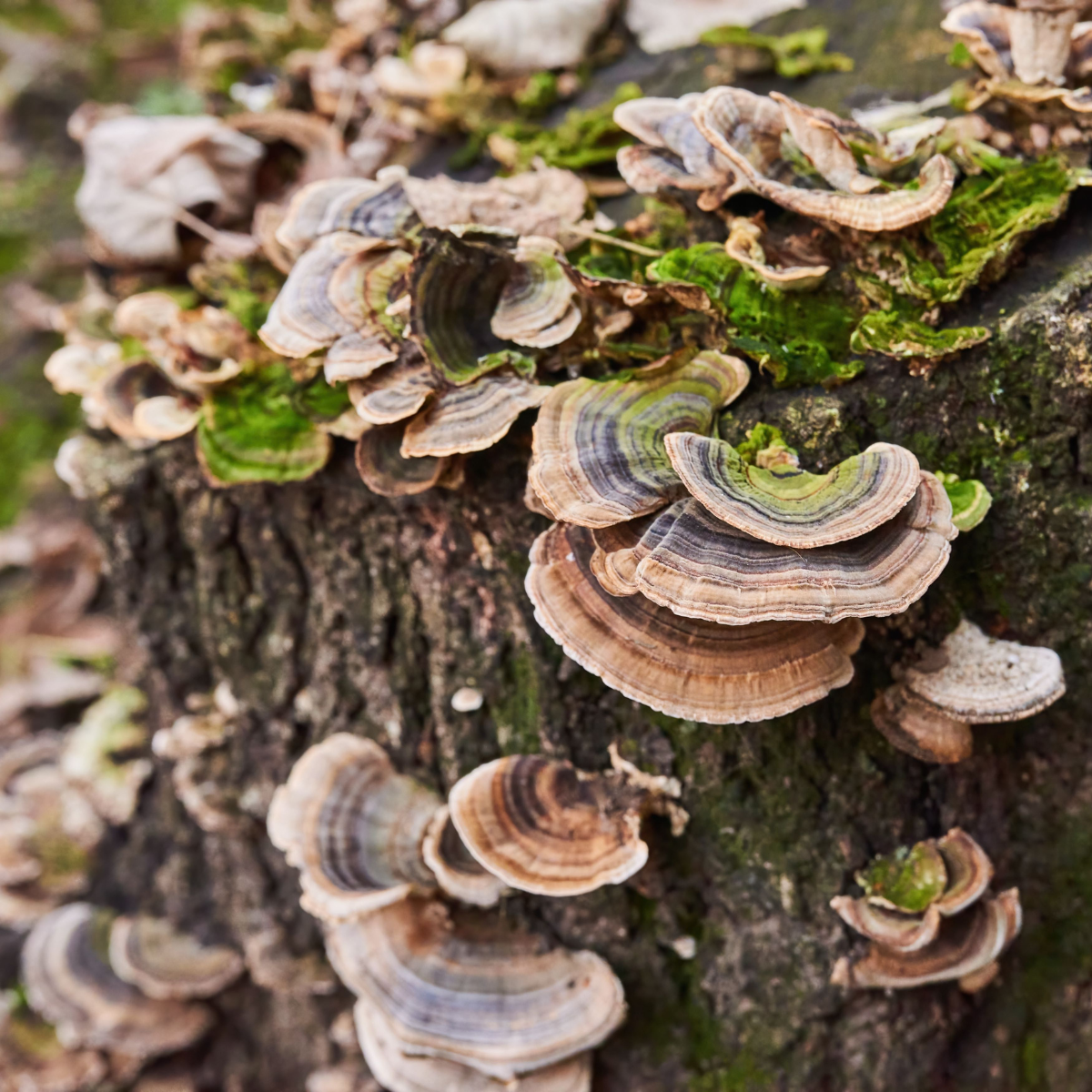
Turkey Tail mushrooms (Trametes versicolor) are a type of fungi that belong to the Polyporaceae family. They are widely distributed and can be found in forests around the world, growing on decaying logs, tree stumps, and branches. The name "Turkey Tail" comes from their unique appearance, as the fan-shaped caps of these mushrooms often display concentric rings of various colors that resemble the pattern of a turkey's tail feathers.
Turkey Tail mushrooms have been used for centuries in traditional medicine, particularly in Asian cultures such as Traditional Chinese Medicine and Japanese herbal medicine. They are valued for their potential medicinal properties and have been studied for their immune-strengthening and health-promoting effects.
These mushrooms contain various bioactive compounds, including polysaccharides (such as beta-glucans), which contribute to their health benefits. Research suggests that Turkey Tail mushrooms have immunomodulatory effects, meaning they can help regulate and enhance the immune system's function. Because of this, they have been investigated for their potential role in supporting immune health and as complementary treatments for conditions like cancer and metabolic illnesses.
Featured Fungi
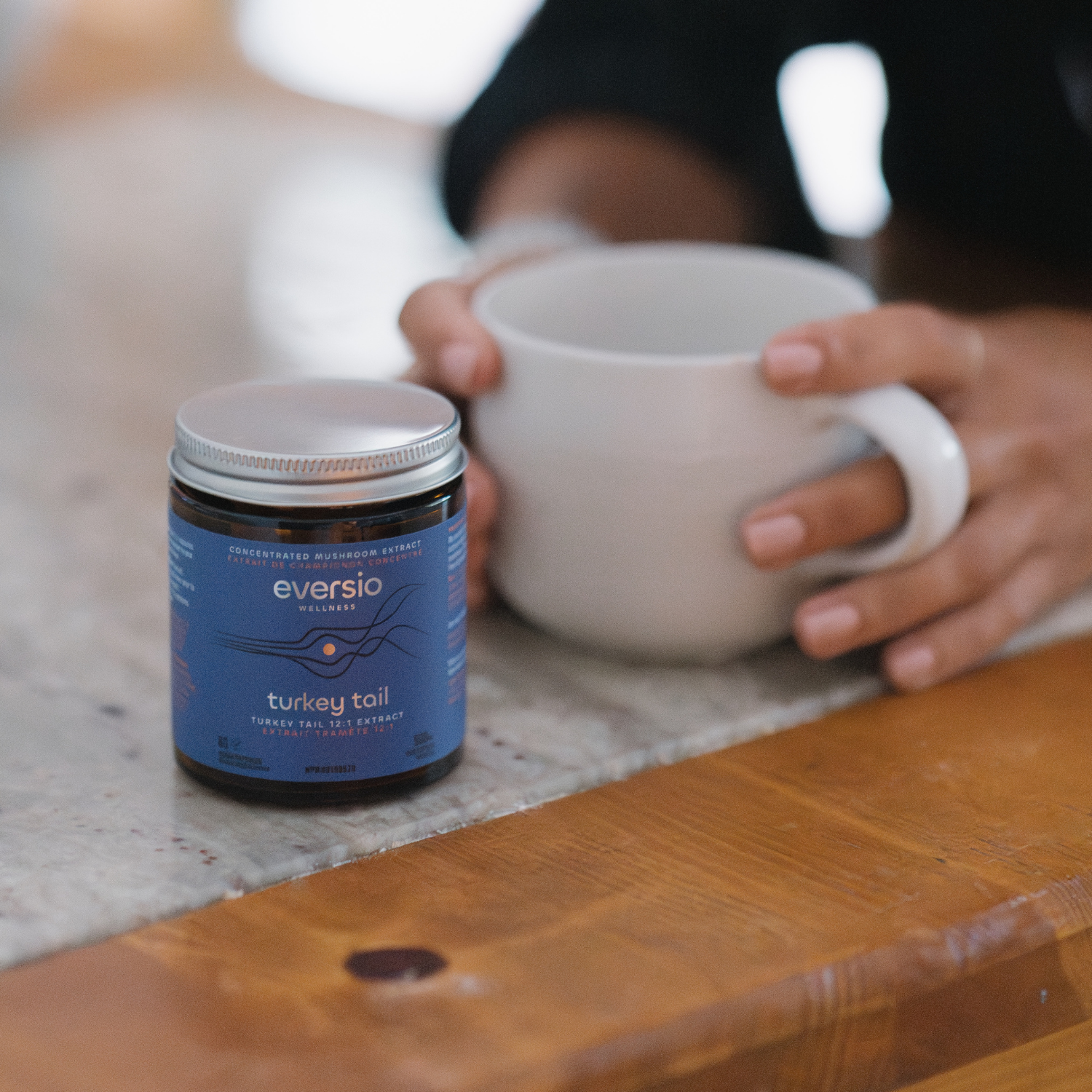
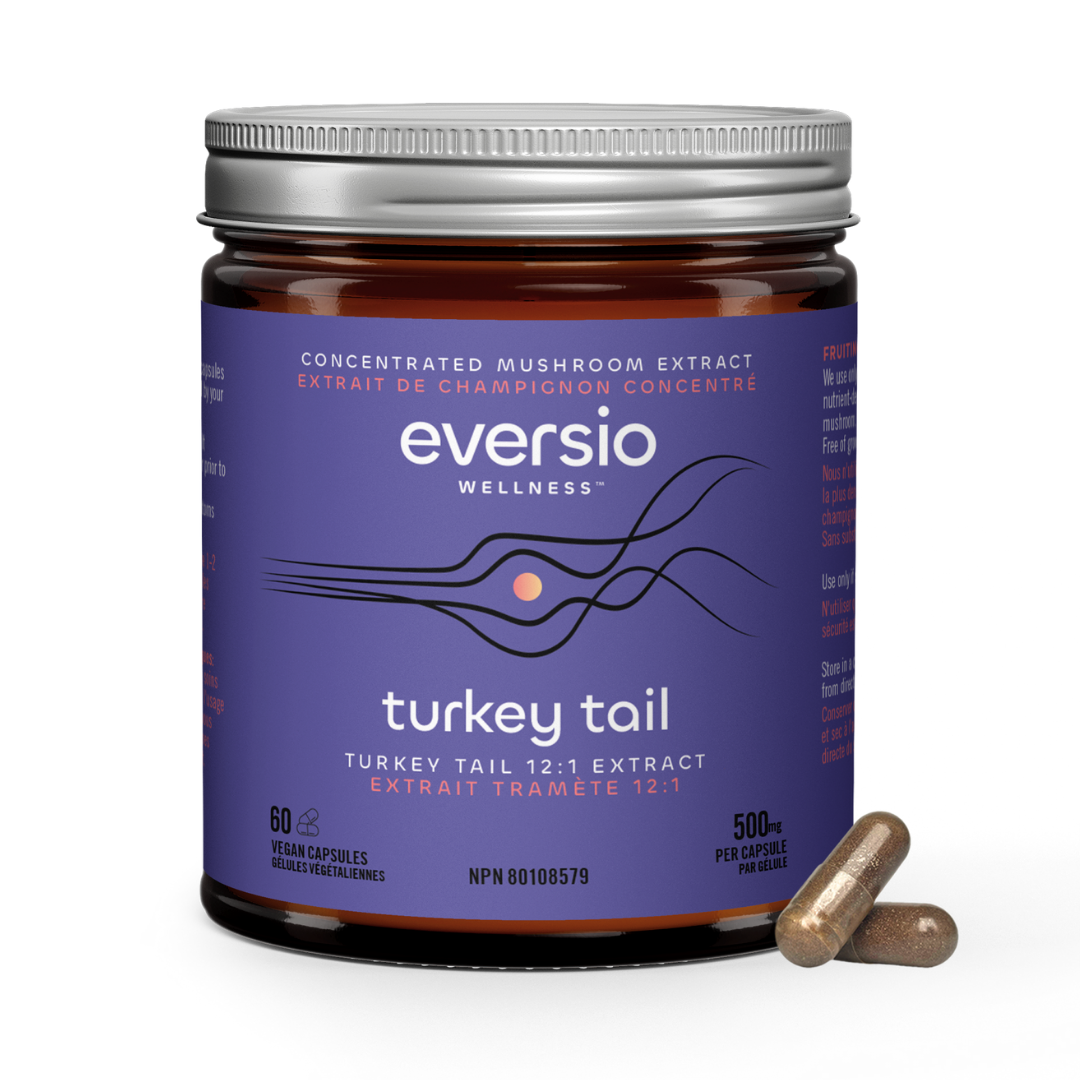
The Benefits Of Turkey Tail
Turkey Tail mushroom supplements are renowned for their potential to enhance overall health, largely due to the diverse array of bioactive compounds they contain. These compounds are thought to interact synergistically with the body's systems, supporting immune function, promoting gut health, and potentially aiding in the body's natural defense mechanisms. The therapeutic properties of Turkey Tail mushrooms have made them a popular choice for those seeking natural ways to bolster their well-being and maintain optimal health.

In Traditional Chinese Medicine, Turkey Tail mushrooms have been employed to support overall health and bolster immune function. Their use in this context is deeply rooted in the concept of holistic wellness and balance within the body.
In recent times, modern scientific research has further illuminated the potential of Turkey Tail mushrooms. Studies have explored their applications as adjunct treatments where they are investigated for their potential to enhance the efficacy of conventional therapies and improve the overall quality of life for patients.
One particularly noteworthy application is their use alongside standard cancer treatments to support immune function and mitigate treatment-related side effects. In regions like Japan, Turkey Tail mushrooms have been integrated into complementary cancer care protocols, with the aim of extending patient survival rates and enhancing their well-being during treatment.

Turkey Tail mushrooms contain polysaccharides that have been extensively investigated for their potential to boost the health of the immune system. Among these compounds, Polysaccharide Krestin (PSK) from Turkey Tail has garnered particular attention due to its high biological activity [1]. PSK's effectiveness is so notable that Japan has classified it as an approved adjunct to cancer care as its ability to fortify the immune system has contributed to the extended well-being of individuals fighting cancer [1]. Moreover, the holistic impact of Turkey Tail extends beyond PSK alone, as use of the entire mushroom has been demonstrated to enhance both innate and adaptive immune responses [2]. This dual action enhances our body's primary and secondary lines of defense, enhancing our resilience against harmful pathogens overall.

Turkey Tail mushrooms contain a significant polysaccharide protein complex known as PSP, enriched with substantial amounts of beta-glucans. Research indicates that these immune-activating agents have the remarkable ability to stimulate the production of nitric oxide (NO) and inducible nitric oxide synthase (iNOS) in macrophages treated with Turkey Tail. This activation allows the macrophages to efficiently phagocytize and kill bacteria [3]. In fact, this research study predicts that Turkey Tail’s antibacterial activities open the door to using it as an alternative to antibiotics in certain drug-resistant bacteria. Macrophages, specialized cells responsible for identifying and eliminating pathogenic organisms, possess specific receptors such as dectin-1 and TLR-2, designed to interact with beta-glucans [4]. The engagement of these receptors by beta-glucans sets in motion processes that culminate in the elimination of pathogenic microorganisms [4].

Antibodies are specialized proteins within our bloodstream that our bodies generate upon encountering foreign pathogens. Their primary mission is to combat and eradicate these microorganisms from our system if we come into contact with them. Notably, Turkey Tail has been identified as a substance that can augment the production of antibodies, particularly IgM and IgG [5]. The latter antibody type, IgG, constitutes a significant portion, approximately 75%, of the serum antibodies present in humans [5]. These antibodies are the immune system's molecular warriors, mobilized in response to the presence of foreign pathogens, and they function to neutralize and remove these intruders from our body.
The significance of Turkey Tail's ability to enhance antibody production becomes particularly apparent in scenarios where our body encounters novel pathogens or viruses. If Turkey Tail indeed boosts antibody production in response to these encounters, it implies that our immunity could be prolonged, safeguarding us against the risk of reinfection over extended periods.
In Traditional Chinese Medicine, Turkey Tail mushrooms have been employed to support overall health and bolster immune function. Their use in this context is deeply rooted in the concept of holistic wellness and balance within the body.
In recent times, modern scientific research has further illuminated the potential of Turkey Tail mushrooms. Studies have explored their applications as adjunct treatments where they are investigated for their potential to enhance the efficacy of conventional therapies and improve the overall quality of life for patients.
One particularly noteworthy application is their use alongside standard cancer treatments to support immune function and mitigate treatment-related side effects. In regions like Japan, Turkey Tail mushrooms have been integrated into complementary cancer care protocols, with the aim of extending patient survival rates and enhancing their well-being during treatment.
Turkey Tail mushrooms contain polysaccharides that have been extensively investigated for their potential to boost the health of the immune system. Among these compounds, Polysaccharide Krestin (PSK) from Turkey Tail has garnered particular attention due to its high biological activity [1]. PSK's effectiveness is so notable that Japan has classified it as an approved adjunct to cancer care as its ability to fortify the immune system has contributed to the extended well-being of individuals fighting cancer [1]. Moreover, the holistic impact of Turkey Tail extends beyond PSK alone, as use of the entire mushroom has been demonstrated to enhance both innate and adaptive immune responses [2]. This dual action enhances our body's primary and secondary lines of defense, enhancing our resilience against harmful pathogens overall.
Turkey Tail mushrooms contain a significant polysaccharide protein complex known as PSP, enriched with substantial amounts of beta-glucans. Research indicates that these immune-activating agents have the remarkable ability to stimulate the production of nitric oxide (NO) and inducible nitric oxide synthase (iNOS) in macrophages treated with Turkey Tail. This activation allows the macrophages to efficiently phagocytize and kill bacteria [3]. In fact, this research study predicts that Turkey Tail’s antibacterial activities open the door to using it as an alternative to antibiotics in certain drug-resistant bacteria. Macrophages, specialized cells responsible for identifying and eliminating pathogenic organisms, possess specific receptors such as dectin-1 and TLR-2, designed to interact with beta-glucans [4]. The engagement of these receptors by beta-glucans sets in motion processes that culminate in the elimination of pathogenic microorganisms [4].
Antibodies are specialized proteins within our bloodstream that our bodies generate upon encountering foreign pathogens. Their primary mission is to combat and eradicate these microorganisms from our system if we come into contact with them. Notably, Turkey Tail has been identified as a substance that can augment the production of antibodies, particularly IgM and IgG [5]. The latter antibody type, IgG, constitutes a significant portion, approximately 75%, of the serum antibodies present in humans [5]. These antibodies are the immune system's molecular warriors, mobilized in response to the presence of foreign pathogens, and they function to neutralize and remove these intruders from our body.
The significance of Turkey Tail's ability to enhance antibody production becomes particularly apparent in scenarios where our body encounters novel pathogens or viruses. If Turkey Tail indeed boosts antibody production in response to these encounters, it implies that our immunity could be prolonged, safeguarding us against the risk of reinfection over extended periods.




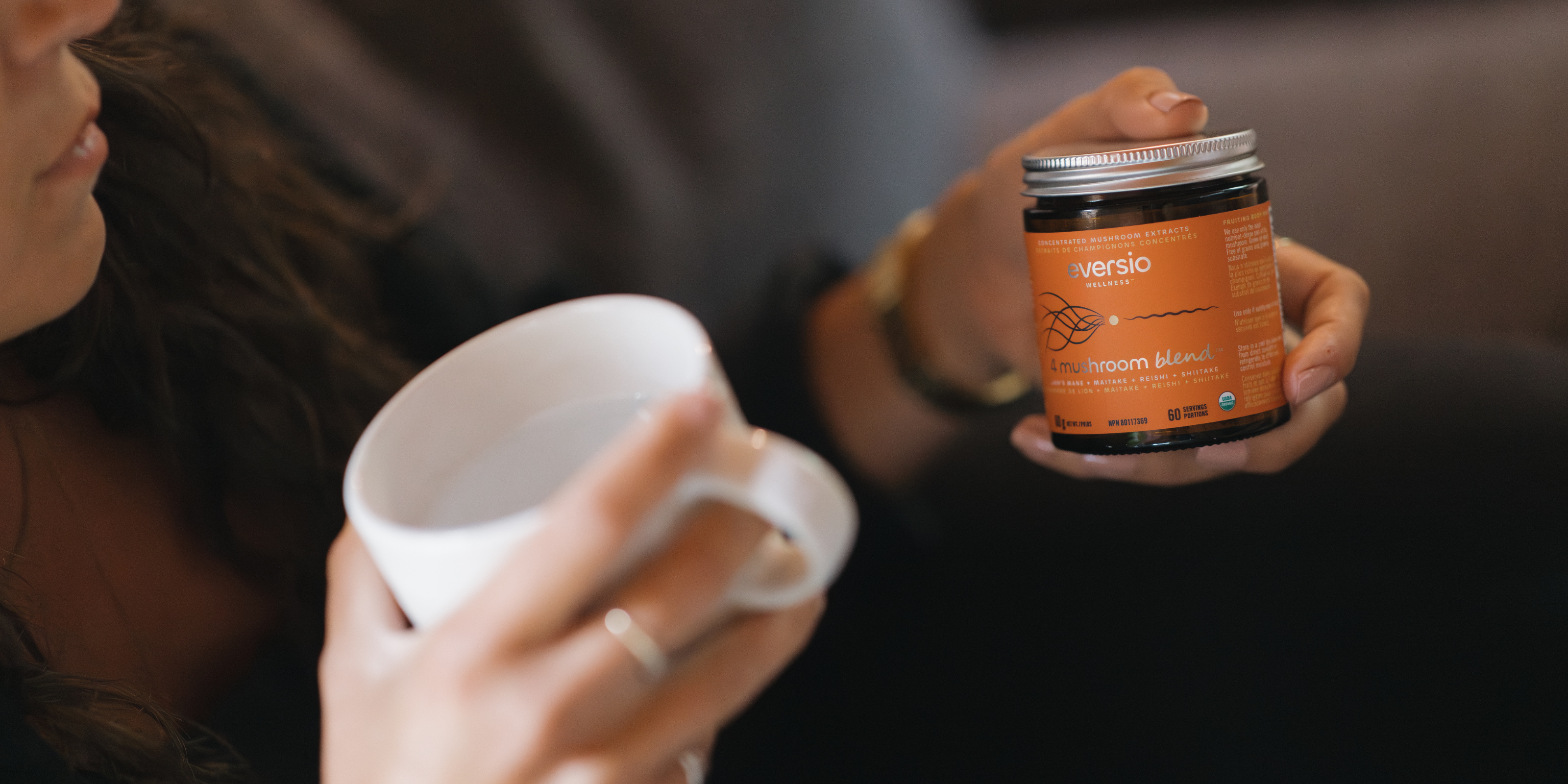
EVERSIO WELLNESS
Functional mushrooms are powerful on their own, but when combined, they create a synergy that amplifies their benefits, known as the entourage effect." This natural phenomenon occurs when the diverse bioactive compounds found in different mushroom species work together, enhancing each other's effects and supporting overall wellness more effectively than any single mushroom could alone.
Whether it's strengthening immunity, improving cognitive function, or enhancing energy levels, the combined power of these mushrooms provides a more balanced and potent impact on your health, helping you achieve holistic well-being.


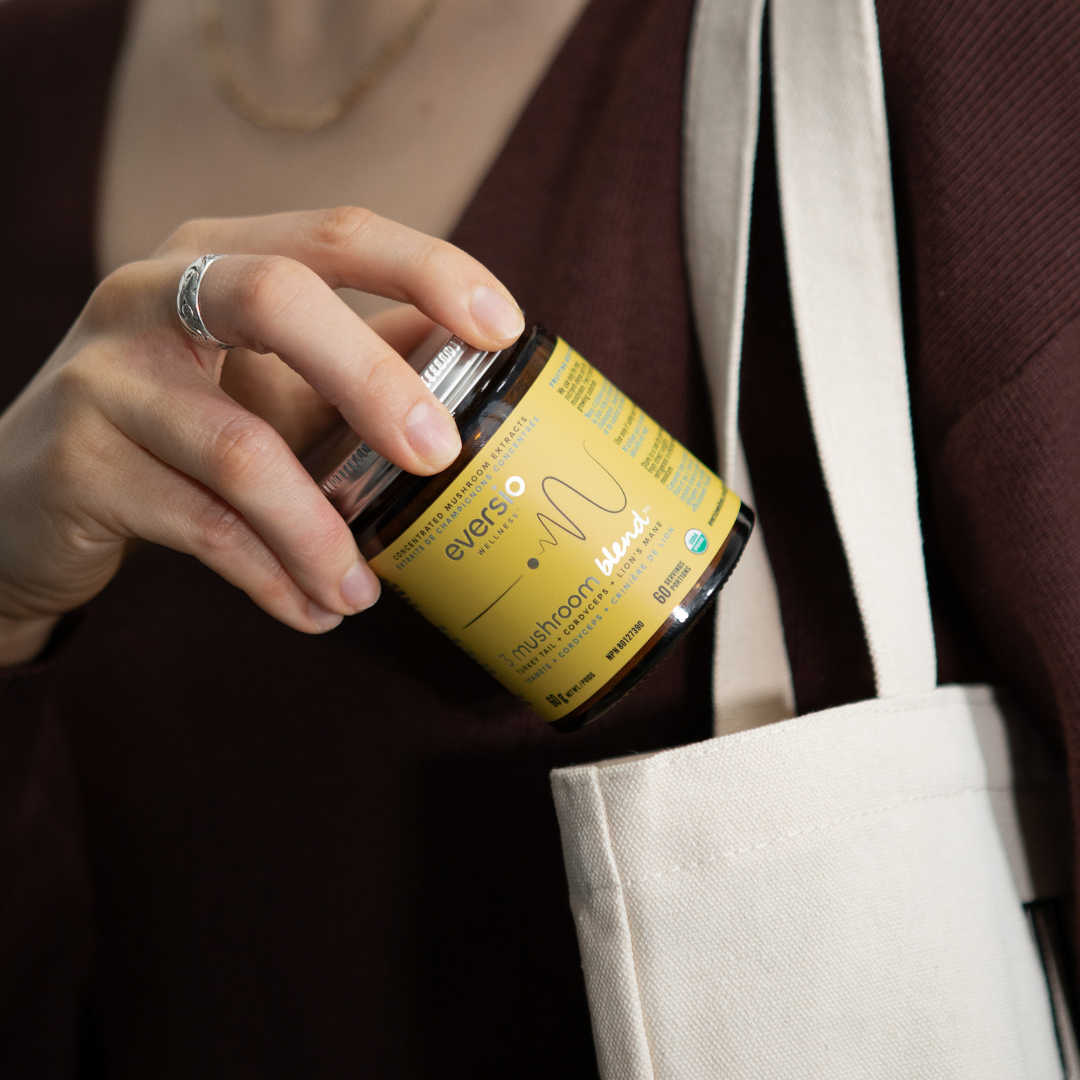
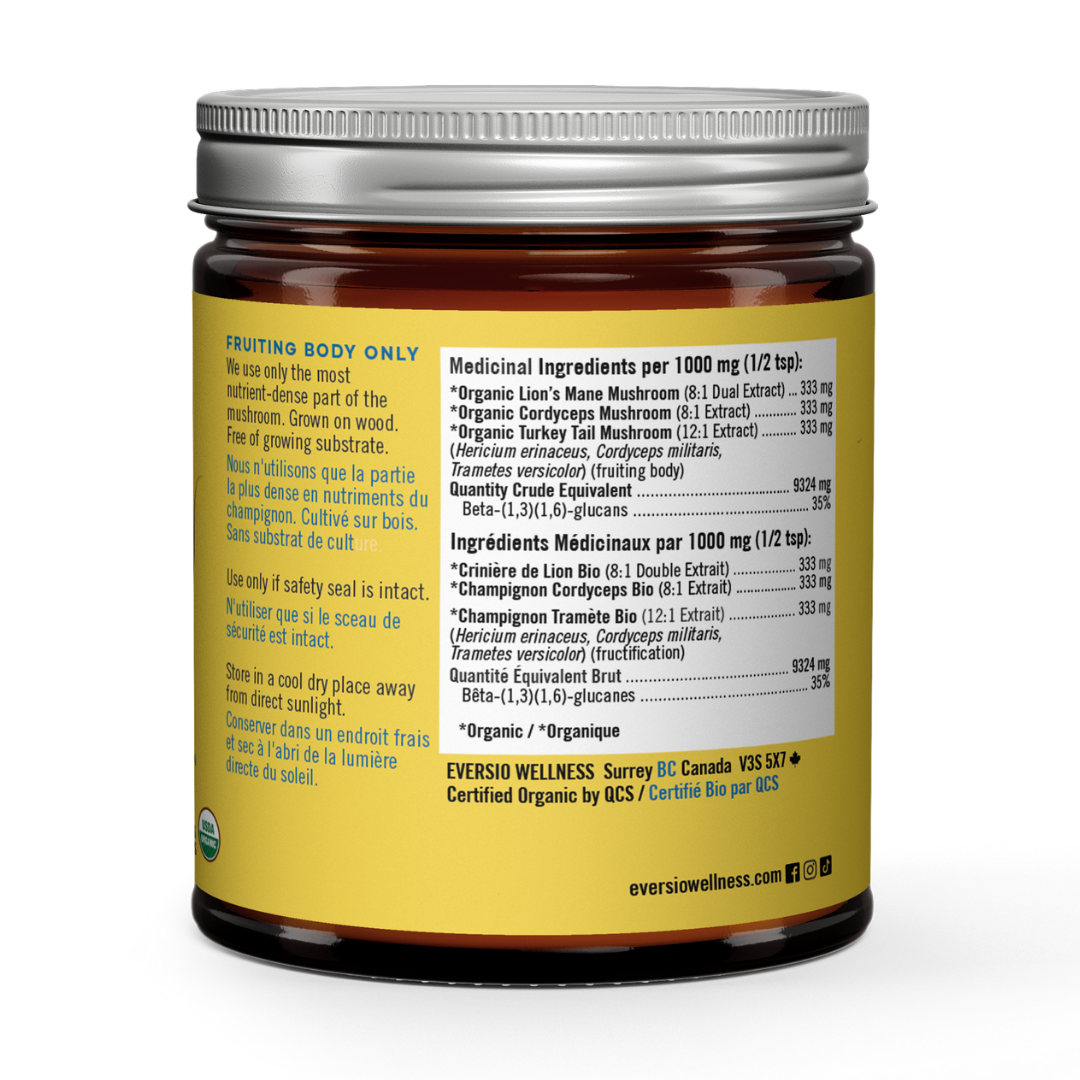
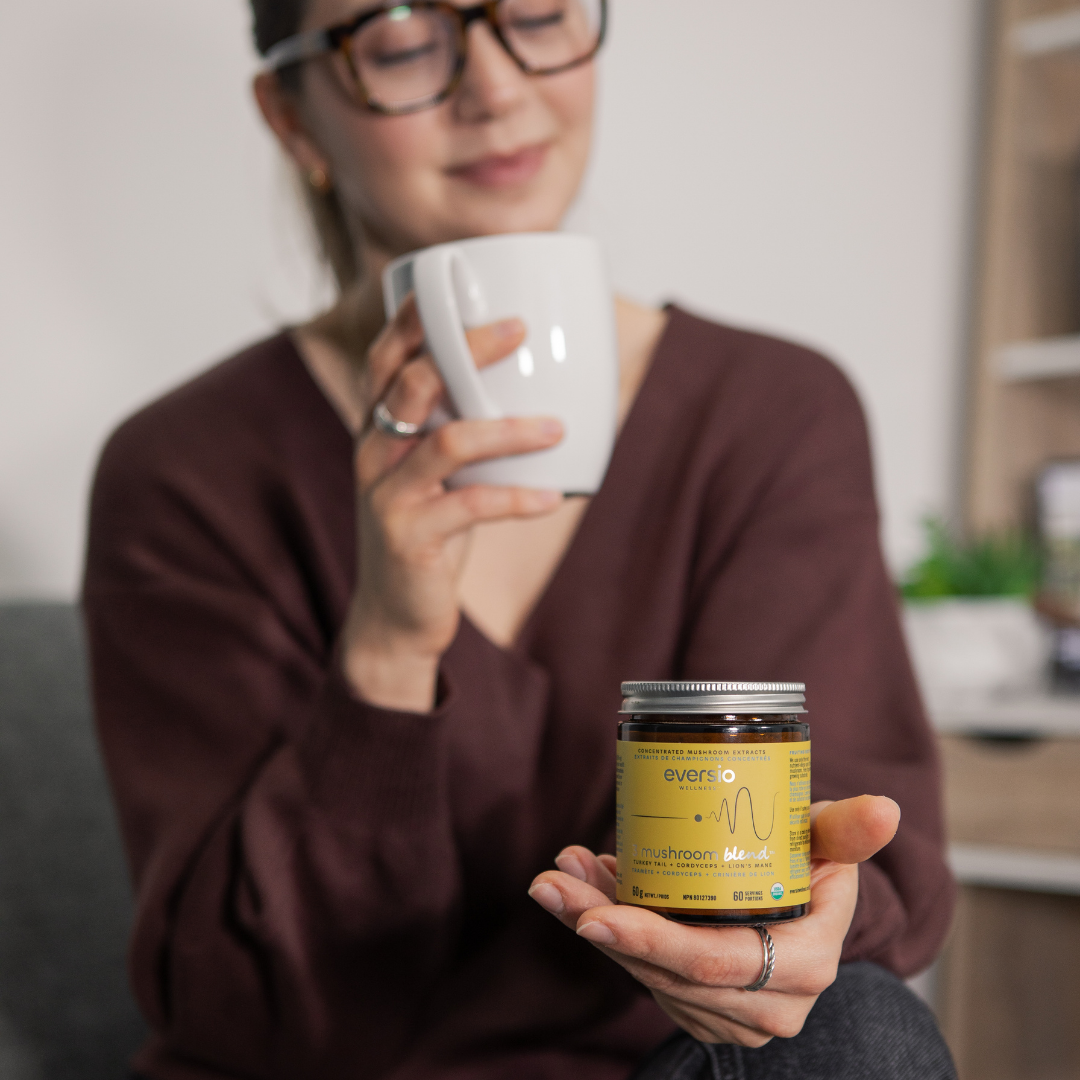
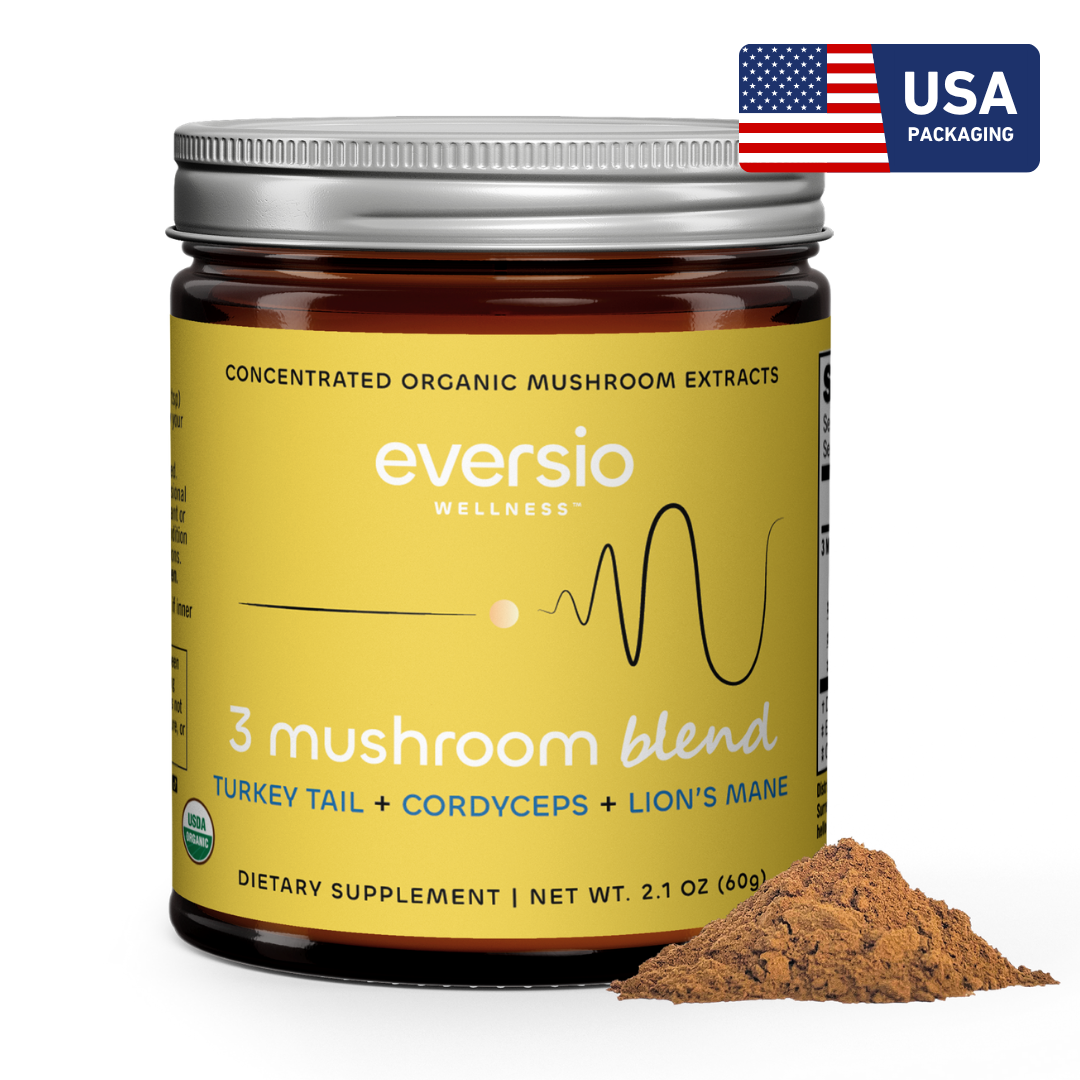
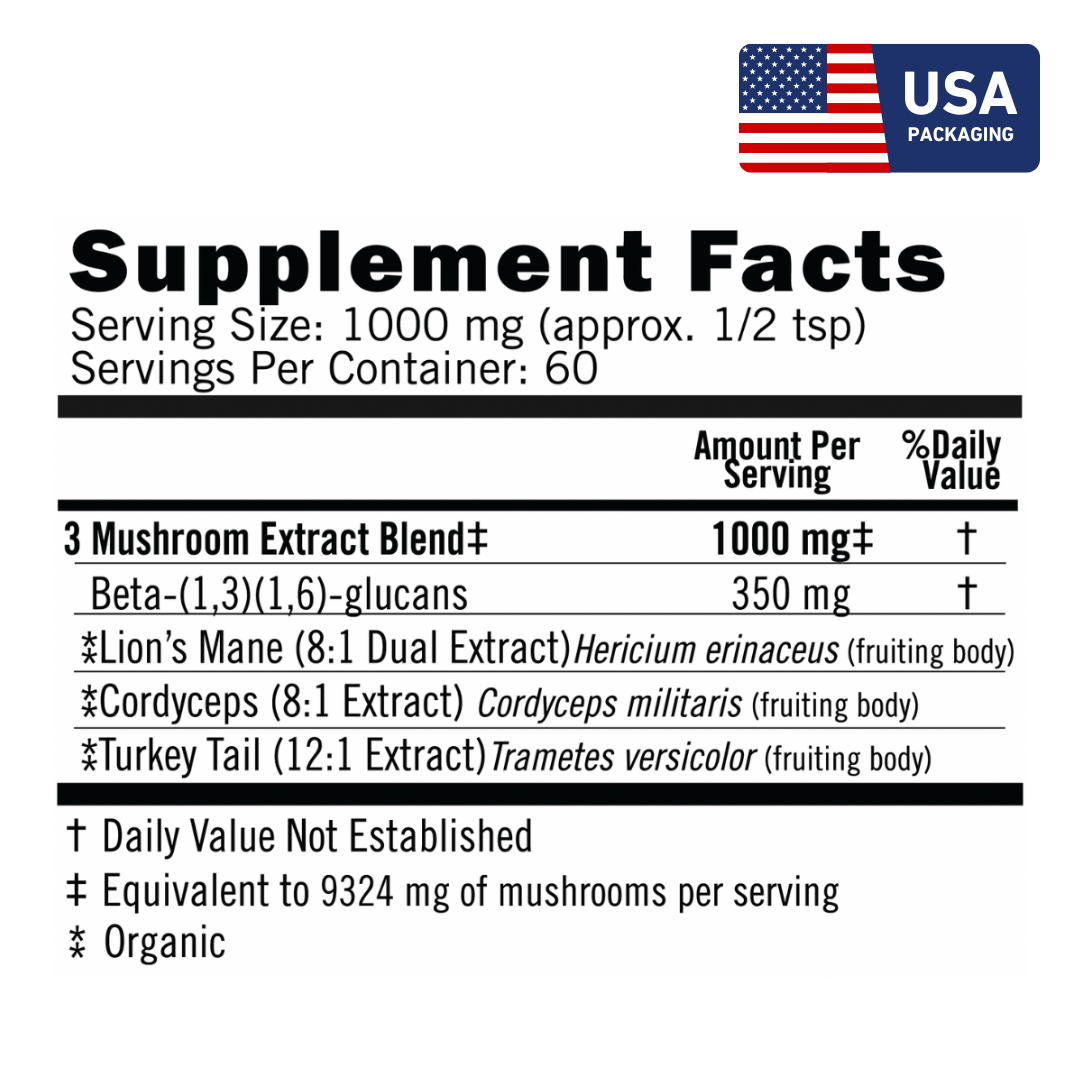
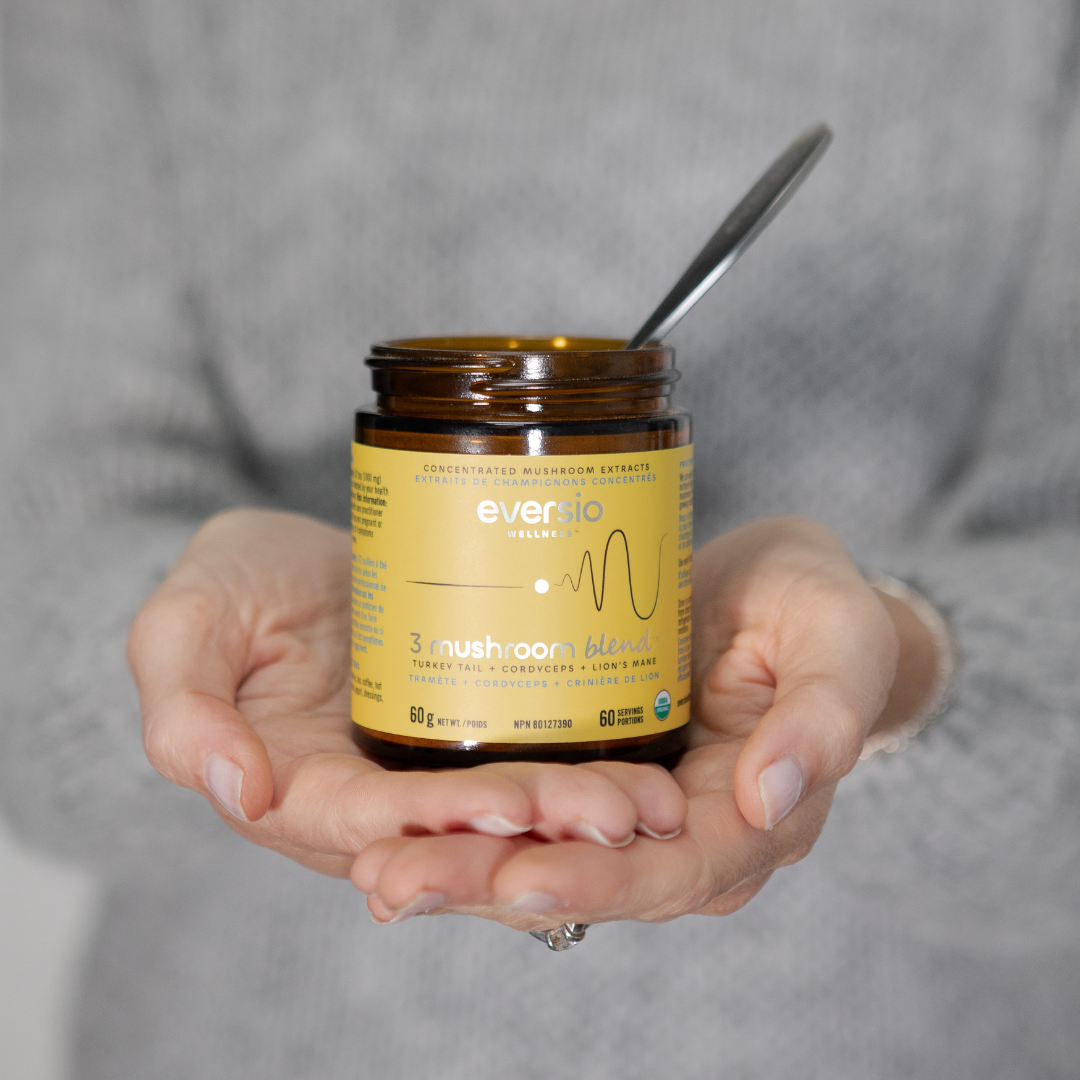

Upgrade Your Daily Routine With Our 3 Mushroom Blend of Mushroom Extracts With a Beneficial Dose of Turkey Tail + Cordyceps + Lion's Mane Functional Mushrooms
Featuring organic certified Turkey Tail 12:1 Extract + Cordyceps Militaris 8:1 Extract + Lion’s Mane 8:1 Dual Extract, the 3 Mushroom Blend was created to help you start your day with healthy intentions.
Adding ½ teaspoon (1000mg) of this premium mushroom extract blend to your morning smoothies, teas, coffees, oatmeal, chia pudding, or yogurt will help to support your immune system, energy levels, and brain function as you prepare to slay the day.*
We make the 3 Mushroom Blend from equal amounts of our three most popular functional mushrooms to bring you the convenience of their combined benefits in one small serving that has become an everyday non-negotiable for many of our loyal customers.
Experience an all-natural energy and brain boost without any caffeine. We can't think of a better way to optimize the potential for an awesome day!
Love this product and need a refill? You can find the refill pouch HERE
The Fungi Fineprint
The sections below provide valuable insights into functional mushrooms' benefits, safety, research, and practical use. These notes help you better understand how these powerful natural ingredients can support your health and well-being. Whether you're new to functional mushrooms or looking to deepen your knowledge, you'll find helpful information right here to guide your wellness journey.
Benefits Summarized
Turkey Tail mushroom supplements offer a range of potential health benefits that stem from their bioactive compounds and interactions with the body's systems.
Turkey Tail mushrooms are rich in polysaccharides, including Polysaccharide Krestin (PSK) – most often found in species from Japan, and Polysaccharide Peptide (PSP) – most often found in species from China, which have been shown to stimulate and modulate the immune system. They can enhance the production of immune cells, improve immune response, and promote overall immune system health. The antioxidants present in Turkey Tail mushrooms help combat oxidative stress and reduce damage caused by free radicals. This can contribute to healthier cells and tissues and may play a role in preventing chronic diseases.
Turkey Tail mushrooms contain prebiotics, which promote the growth of beneficial gut bacteria. A healthy gut microbiome is associated with improved digestion, nutrient absorption, and overall digestive well-being.
Turkey Tail mushrooms possess natural antimicrobial properties that can help the body fight off infections and harmful microorganisms. They may contribute to a stronger defense against various pathogens.
Turkey Tail mushrooms are considered adaptogens, which means they may help the body better adapt to stress and maintain balance. This can contribute to improved mental and physical resilience.
The combined effects of immune support, antioxidant activity, and various other potential benefits contribute to an overall sense of well-being and vitality.
Health & Safety
Turkey Tail mushroom supplements have garnered attention for their potential health benefits, particularly in supporting immune function, antioxidant activity, and overall well-being. While Turkey Tail supplements offer exciting possibilities, it's important to prioritize health and safety. As with any dietary supplement, it's recommended to consult a health care professional before incorporating Turkey Tail supplements into your routine, especially if you have underlying health conditions or are taking medications. While generally considered safe, potential side effects and interactions should be carefully considered. Additionally, sourcing reputable and high-quality
supplements is crucial to ensure efficacy and minimize risks. Maintaining moderation and adhering to recommended dosages is advised, as excessive consumption could potentially lead to adverse effects. By approaching Turkey Tail mushroom supplements with informed caution, individuals can explore their potential benefits while prioritizing their overall health and well-being.
Research & References
[1] PDQ Integrative, Alternative, and Complementary Therapies Editorial Board.
Medicinal Mushrooms (PDQ®): Patient Version. 2022 Jul 29. In: PDQ Cancer Information Summaries [Internet]. Bethesda (MD): National Cancer Institute (US); 2002-. Available from: https://www.ncbi.nlm.nih.gov/books/NBK424937/
[2] Benson KF, Stamets P, Davis R, Nally R, Taylor A, Slater S, Jensen GS. The mycelium of the Trametes versicolor (Turkey tail) mushroom and its fermented substrate each show potent and complementary immune activating properties in vitro. BMC Complement Altern Med. 2019 Dec 2;19(1):342. doi: 10.1186/s12906-019-2681-7. PMID: 31791317; PMCID: PMC6889544.
[3] Shao-Hua Shi, Wen-Tao Yang, Ke-Yan Huang, Yan-Long Jiang, Gui-Lian Yang, Chun-Feng Wang, Yu Li. Beta-Glucans from Coriolus versicolor protect mice against S. typhimurium challenge by activation of macrophages. International Journal of Biological Macromolecules, Volume 86, 2016, Pages 352-361. ISSN 0141-8130.
https://doi.org/10.1016/j.ijbiomac.2016.01.058.
[4] Mirończuk-Chodakowska I, Kujawowicz K, Witkowska AM. Beta-Glucans from Fungi: Biological and Health-Promoting Potential in the COVID-19 Pandemic Era. Nutrients. 2021 Nov 6;13(11):3960. doi: 10.3390/nu13113960. PMID: 34836215; PMCID: PMC8623785.
[5] Habtemariam S. Trametes versicolor (Synn. Coriolus versicolor) Polysaccharides in Cancer Therapy: Targets and Efficacy. Biomedicines. 2020 May 25;8(5):135. doi: 10.3390/biomedicines8050135. PMID: 32466253; PMCID: PMC7277906.
[6] Bendich A. Physiological role of antioxidants in the immune system. J Dairy Sci. 1993 Sep;76(9):2789-94. doi: 10.3168/jds.S0022-0302(93)77617-1. PMID: 8227682.
[7] Rašeta M, Popović M, Knežević P, Šibul F, Kaišarević S, Karaman M. Bioactive
Phenolic Compounds of Two Medicinal Mushroom Species Trametes versicolor and
Stereum subtomentosum as Antioxidant and Antiproliferative Agents. Chem Biodivers. 2020 Dec;17(12):e2000683. doi: 10.1002/cbdv.202000683. Epub 2020 Nov 17. PMID: 33058392.
[8] Pérez-Cano FJ, Castell M. Flavonoids, Inflammation, and Immune System. Nutrients. 2016 Oct 21;8(10):659. doi: 10.3390/nu8100659. PMID: 27775647; PMCID: PMC5084045.
[9] Li Y, Yao J, Han C, Yang J, Chaudhry MT, Wang S, Liu H, Yin Y. Quercetin,
Inflammation, and Immunity. Nutrients. 2016 Mar 15;8(3):167. doi: 10.3390/nu8030167. PMID: 26999194; PMCID: PMC4808895.
[10] Dubois-Deruy E, Peugnet V, Turkieh A, Pinet F. Oxidative Stress in Cardiovascular Diseases. Antioxidants (Basel). 2020 Sep 14;9(9):864. doi: 10.3390/antiox9090864. PMID: 32937950; PMCID: PMC7554855.
[11] Senoner T, Dichtl W. Oxidative Stress in Cardiovascular Diseases: Still a Therapeutic Target? Nutrients. 2019 Sep 4;11(9):2090. doi: 10.3390/nu11092090. PMID: 31487802; PMCID: PMC6769522.
[12] Standish LJ, Wenner CA, Sweet ES, Bridge C, Nelson A, Martzen M, Novack J, Torkelson C. Trametes versicolor mushroom immune therapy in breast cancer. J Soc Integr Oncol. 2008 Summer;6(3):122-8. PMID: 19087769; PMCID: PMC2845472.
[13] Guggenheim AG, Wright KM, Zwickey HL. Immune Modulation From Five Major Mushrooms: Application to Integrative Oncology. Integr Med (Encinitas). 2014 Feb;13(1):32-44. PMID: 26770080; PMCID: PMC4684115.
[14] Pallav K, Dowd SE, Villafuerte J, Yang X, Kabbani T, Hansen J, Dennis M, Leffler DA, Newburg DS, Kelly CP. Effects of polysaccharopeptide from Trametes versicolor and amoxicillin on the gut microbiome of healthy volunteers: a randomized clinical trial. Gut Microbes. 2014 Jul 1;5(4):458-67. doi: 10.4161/gmic.29558. Epub 2014 Jul 9. PMID: 25006989.
[15] Liao LY, He YF, Li L, Meng H, Dong YM, Yi F, Xiao PG. A preliminary review of studies on adaptogens: comparison of their bioactivity in TCM with that of ginseng-like herbs used worldwide. Chin Med. 2018 Nov 16;13:57. doi: 10.1186/s13020-018-0214-9. PMID: 30479654; PMCID: PMC6240259.
[16] Chu B, Marwaha K, Sanvictores T, et al. Physiology, Stress Reaction. [Updated 2022 Sep 12]. In: StatPearls [Internet]. Treasure Island (FL): StatPearls Publishing; 2022 Jan-. Available from: https://www.ncbi.nlm.nih.gov/books/NBK541120/
[18] Lo HC, Hsu TH, Lee CH. Extracellular Polysaccharopeptides from Fermented Turkey Tail Medicinal Mushroom, Trametes versicolor (Agaricomycetes), Mitigate Oxidative Stress, Hyperglycemia, and Hyperlipidemia in Rats with Type 2 Diabetes Mellitus. Int J Med Mushrooms. 2020;22(5):417-429. doi: 10.1615/IntJMedMushrooms.2020034560. PMID: 32749097.
Where To Buy
In the vast market of medicinal mushrooms, it is important to prioritize awareness of the product's composition to ensure the highest potency. At Eversio Wellness, our commitment lies in offering exclusively 100% fruiting body mushroom extracts, maintaining a transparent approach towards consumers by providing Certificates of Analysis (COAs) for each product. These COAs serve as a reassurance, scientifically confirming the claimed percentages of beneficial constituents through laboratory testing. Furthermore, the COAs also verify the absence of heavy metals and microbial contaminants, assuring customers of receiving the finest mushroom supplements available.
CONNECT WITH US!
Your Journey Starts Here
Connect with our mushroom wellness community on Instagram! Discover the benefits of functional mushrooms, share your experiences, and engage with like-minded enthusiasts. Let's grow together in our journey towards better health and well-being through the power of mushrooms.
EVERSIO WELLNESS
Join the Eversio community and receive 10% off your first order!
Be the first to know about new offers, great recipes, and mushroom news! You will receive a 10% off discount code to use on your first order as soon as you sign up!
Premium Quality Mushroom Extracts
Eversio means change. Our mission is to change lives through fungi. We intend to do that by offering the best functional mushroom supplements available today.
Eversio Wellness products deliver the benefits of functional mushrooms with premium-grade fruiting body extract products that are vegan, created in a Canadian GMP Certified facility, USDA Organic Certified, non-GMO, third party lab tested, and super concentrated. Each capsule or ½ tsp of our extract blends delivers a FULL BENEFICIAL DOSE in line with current research.






